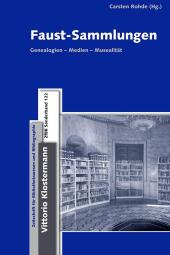 Neuerscheinungen 2018Stand: 2020-02-01 |
Schnellsuche
ISBN/Stichwort/Autor
|
Herderstraße 10
10625 Berlin
Tel.: 030 315 714 16
Fax 030 315 714 14
info@buchspektrum.de |

Carsten Rohde
Faust-Sammlungen
Genealogien - Medien - Musealität
Herausgegeben von Rohde, Carsten
2018. 272 S. 24 cm
Verlag/Jahr: KLOSTERMANN 2018
ISBN: 3-465-04361-8 (3465043618)
Neue ISBN: 978-3-465-04361-4 (9783465043614)
Preis und Lieferzeit: Bitte klicken
Über ein Jahrhundert lang war Faust mehr als ein gewöhnlicher literarhistorischer Forschungsgegenstand. Im Zuge der immensen Resonanz, die Goethes Faust-Tragödie auslöste, entwickelten sich Figur und Stoff in Deutschland zu einem nationalen Identifikationsobjekt. Das ´Faustische´ avancierte zum Signum eines Zeitalters. Für die Selbstreflexion und Selbstbeschreibung der Kulturnation Deutschland im 19. und noch in der ersten Hälfte des 20. Jahrhunderts war der Mythos Faust von zentraler Bedeutung. Die singuläre Bedeutung des Faust-Stoffes spiegelt sich auch darin wider, dass er im 19. und 20. Jahrhundert wie kein anderes literarisches Stoffgebiet zum Gegenstand von zahlreichen zunächst privaten, später auch öffentlichen Sammlungsaktivitäten geworden ist. Was dabei ins Auge sticht, sind die Breite und die Internationalität der sammelnden Personen und Institutionen. Die in diesem Band versammelten Beiträge fragen nach der Entstehung, der Zusammensetzung, den Gegenständen und den Präsentationsformen dieser Sammlungen - und danach, was sie über das kulturelle Gedächtnis nicht nur der Deutschen verraten.
For more than a century, Faust was more than just an object of literary theory. In Germany, in the course of the overwhelming response Goethe´s Faust tragedy spawned, both character and literary material developed into a national object of identification. The ´Faustian´ became the sign of an age. For the self-reflection and self-description of Germany as a cultural nation in the 19th and in the first half of the 20th century, the Faust myth was of central importance. The singular meaning of the Faust story is also reflected in the fact that in the 19th and 20th centuries it became the subject of numerous at first predominantly private, and later also public, collecting activities, unlike any other literary subject matter. What stands out is the breadth and internationality of the collectors, both individual and institutional. The contributions collected in this volume discuss the origins, the composition, the objects and the forms of presentation of these collections - and what they reveal about the cultural memory (not just) of the Germans.


